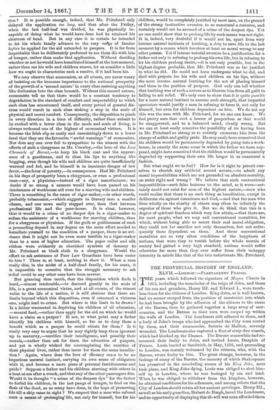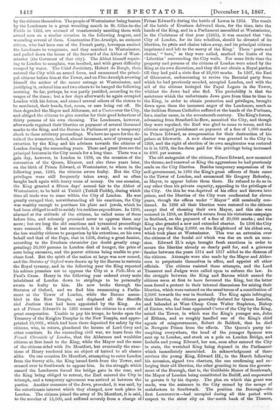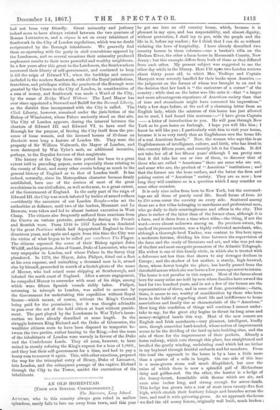T "years which followed the signature of Magna Charta in 1215,
including the remainder of the reign of John, and those of his son and grandson, Henry HI. and Edward I., were troub- ions times for the citizens of London. King John, as is well known, had no sooner escaped from the position of constraint into whiph he had been brought by the adhesion of the citizens to the cause of the Barons, than he gathered together a large army of mer- cenaries, and the Barons in their turn were cooped up within the walls of London. The Londoners still adhered to them, and a body of John's troops who had approached the City were routed by them, and their commander, Saverie de Mallion, severely wounded. The Londoners also captured a fleet of sixty-five vessels, which had blocked up the Thames. The Barons meanwhile had re- nounced their fealty to John, and invited Louis, Dauphin of France. Louis landed at Sandwich, in May, 1216, and proceeding to London, was warmly welcomed by the citizens, who, with the Barons, swore fealty to him. The great change, however, in the feelings of many of the Barons, the memory of which Shakespeare has preserved in the concluding scenes of his King John, next took place, and King John dying, LOIliB was obliged to shut him- self up in London, where he was besieged by sea and land. When he was obliged to withdraw from the kingdom, however, he obtained conditions for his adherents, and among others thatthe City of London should retain all her ancient privileges. Henry
as well as his earlyguardiau, Hubert de Burgh, bated the Londoners, and an opportunityof displayingthis was soon afforded them by the citizens themselves. The people of Westminster being beaten by the Londoners in a great wrestling match in St. Giles-in-the Fields in 1222, are accused of treacherously wailing them with armed men on a similar occasion in the following August, and wounding several of them. Constantine Fitz-Arnulph, an eminent citizen, who had been one of the French party, hereupon excited the Londoners to vengeance, and they marched to Westminster, and pulled down the house of the Steward of the Abbot of West- minster (the Governor of that city). The Abbot himself repair- ing to London to complain, was insulted, and with great difficulty escaped by water. The Chief Justiciary, Hubert de Burgh, then entered the City with an armed force, and summoned the princi- pal citizens before him at the Tower, and on Fitz-Arnulph avowing himself the author of the recent outrage at Westminster, and justifying it, ordered him and two others to be hanged the following morning. So far, perhaps, he was partly justified, according to the usages of the times ; but a few days afterwards he again occupied London with his forces, and caused several others of the rioters to be mutilated, their hands, feet, noses, or ears being cut off. He then degraded the Mayor and Aldermen, set a Custos over the City, and obliged the citizens to give sureties for their good behaviour of thirty persons of his own choosing. The Londoners, however, afterwards regained their liberties on payment of several thousand marks to the King, and the Barons in Parliament put a temporary check to these arbitrary proceedings. We have no space for the de- tails of the numerous, indeed, almost incessant, acts of tyranny and extortion by the King and his advisers towards the citizens of London during the succeeding years. These and great fires are the principal features in the City annals for a long time. There was a gala day, however, in London in 1236, on the occasion of the coronation of the Queen, Eleanor, and also three years later, on the birth of Prince Edward, at Westminster, to whom in the following year, 1240, the citizens swore fealty. But the City privileges were still frequently taken away, and as often bought back again with heavy sums of money. On one occasion, the King granted a fifteen days' annual fair to the Abbot of Westminster, to be held at Tuthill (Tothill Fields), during which time all trade was to cease within the City of London. He was greatly enraged that, notwithstanding all his exactions, the City was wealthy enough to purchase his plate and jewels, which he had been obliged to sell to satisfy his reckless expenditure. In 1250, alarmed at the attitude of the citizens, he called some of them before him, and solemnly promised never to oppress them any more ; but ere long the old exactions and tyrannical proceedings were resumed. He at last succeeded, it is said, in so reducing the less wealthy citizens to pauperism by his extortions, on his own behalf and that of the Pope, that in 1258, during a great famine, according to the Evesham. chronicler (no doubt greatly exag- gerating) 20,000 persons in London died of hunger, the price of corn being excessive, and the poorer citizens being unable to pur- chase food. But the spirit of the nation at large was now roused, and the Statutes of Oxford were drawn up by the Barons to restrain the Royal tyranny, and in the following year the King repeated his solemn promises not to oppress the City at a Folk-Mote at Paul's Cross. Henry in the following year ordered every male inhabitant of London down to striplings to be personally sworn to fealty to him. He now broke through the Statutes of Oxford, and we find him summoning a Parlia- ment at the Tower of London, while the Barons assem- bled in the New Temple, and displaced all the Sheriffs and Justices that had been appointed by the King. An act of Prince Edward's in 1263 roused the citizens to a state of great exasperation. Unable to pay his troops, he broke open the Treasury of the Knights Templar in the New Temple, and appro- priated 10,0001., which had been there deposited for safety by the citizens, who, in return, plundered the houses of Lord Grey and other courtiers. In the succeeding civil war, we learn from the French Chronicle of London, that the Aldermen and wealthier citizens at first leant to the King, while the Mayor and the mass of the citizens sided with De Montfort, but eventually the exac- tions of Henry rendered him an object of hatred to all classes alike. On one occasion De Montfort, attempting to enter London from the Surrey aide, the King issued forth from the Tower, and crossed over to Southwark to oppose him. In the struggle which ensued the Londoners forced the bridge gate in the rear, and the King being obliged to retreat, the Earl entered the City in triumph, and a temporary agreement was arrived at between the parties. Another massacre of the Jews, provoked, it was said, by the extortionate interest which they charged, now took place in London. The citizens joined the army of De Montfort, it is said, to the number of 15,000, and suffered severely from a charge of
Prince Edward's during the battle of Lewes in 1264. The result of the battle of Evesham delivered them, for the time, into the hands of the King, and in a Parliament assembled at Westminster, in the Christmas of that year (1265), it was enacted that 'the City of London, for its late rebellion, should be divested of its liberties, its pests and chains taken away, and its principal citizens imprisoned and left to the mercy of the King.' These 'posts and chains,' "bars," as they were called, marked the limits of the 'Liberties' surrounding the City walls.. For some little time the property and persons of the citizens of London were seized by.the King at his own discretion, and they did not obtain a Royal pardon till they had paid a civic fine of 23,000 marks. In 1267, the Earl of Gloucester, endeavouring to revive the Baronial party from which he had previously seceded, occupied London, and with the aid of the citizens besieged the Papal Legate in the Tower, whither the Jews had also fled. The probability is that the assistance which the unfortunate Jews gave from time to time to the King, in order to obtain protection and privileges, brought. down upon them the incessant anger of the Londoners, much as. the luckless Roman Catholics suffered at the hands of the Puritans, for a similar cause, in the seventeenth century. The King's forces, advancing from Stratford-le-Bow, assaulted the City, and though they were repulsed, the Earl was glad to come to terms, and the citizens escaped.punishment on payment of a fine of 1,000 marks. to Prince Edward, as compensation for their destruction of his. palace at Isleworth. A new charter was granted to the City in 1268, and the right of election of its own magistrates was restored to it in 1270, the fee-farm paid for this privilege being increased to 400/. per annum.
The old antagonist of the citizens, Prince Edward, now mounted the throne, and renewed as King the aggressions he had previously made on the City liberties. Besides temporary suspensions of its self-government, in 1285 the King's great officers of State came to the Tower of London, and summoned Sir Gregory Itokesley„ as Mayor, to appear before them there. He refused to do so in any other than his private capacity, appealing to the privileges of the City. On this he was deprived of his office and thrown into. prison, and the liberties of the City were confiscated for eleven years, though the offices under " Mayor " still nominally con- tinued. In 1296 all their liberties were restored to the citizeim except that of choosing their own Mayor, and this also was. restored in 1298, on Edward's return from his victorious campaign in Scotland, on the payment of a fine of 20,000 marks ; and the King also granted a new and extended charter. In 1306 the City had to pay the King 2,000/. on the Knighthood of his eldest son,. which took place at Westminster. This was an extension over- the citizens of the feudal aid which was due on such an occa- sion. Edward ll.'s reign brought fresh exactions in order to secure the liberties already so dearly paid for, and a grievous famine between the years 1314 and 1317 added to the distress of the citizens. Attempts were also made by the Mayor and Alder- men to perpetuate themselves in office, and appoint all other- officials. The citizens resisted these attempts, and the Lord Treasurer and Judges were called upon to enforce the law. Is- the struggle between the King and Barons which ensued the- citizens seem at first to have favoured the King, but the latter' soon found a pretext in their internal dissensions for seizing their- liberties, which were restored on the usual terms of a contribution of 2,000/. towards the war in Scotland. The King again infringing their liberties, the citizens generally declared for Queen Isabella,. and beheaded at West Cheap Cross Walter Stapleton, Bishop of Exeter, who had been appointed Castes of the City by the King,. seized the Tower, in which was the King's younger son, John, of Eltham, and so roughly handled one of the King's chief agents of misgovernment, Robert de Baldock, that he died in New-gate Prison from the effects. The Queen's party tri- umphing everywhere, the head of the younger Spencer was sent up to London, and stuck on a pole on London Bridge, and Isabella and young Edward, her son, soon after entered the City- in state, the wretched King being deposed in the Parliament. which immediately assembled. In acknowledgment of these: services the young King, Edward HE., in the March following his accession, signed two charters, the one confirming and en- larging their old liberties, the other granting to them the govern- ment of the Borough, that is, the Guildable Manor of Southwark, the Mayor of London being constituted its Bailiff, and empowered to govern it by his deputy. The plea on which this grant was made, was the nuisance to the City caused by the escape of malefactors to Southwark. The position the Borough—the first LONDINIUM—had occupied during all this period with respect to the sister city on thee north bank of the Thames,. had not been very friendly. Great animosity and jealousy indeed seem to have always existed between the two quarters of Roman LONDINIUM, and a stigma is set on every inhabitant of Southwark in the City of London regulations, which was no doubt reciprocated by the Borough inhabitants. We generally find them co-operating with the party in civil convulsions opposed by the Londoners, and on several occasions their animosity produced unpleasant results to their more powerful and wealthy neighbours. In a few years after this grant to the Londoners, the Southwarkers recovered their liberty of self-government, and continued to keep it till the reign of Edward VI., when the lordships and manors included in the modern Southwark, with all the Royal jurisdictions, franchises, and privileges within the precincts of the Borough were granted by the Crown to the City of London, in consideration of a sum of money, and Southwark was made a Ward of the City, by the name of Bridge Ward TVithout." The Lord Mayor has ever since appointed a Steward and Bailiff for the Borough Liberty, as the district thus incorporated, with the City is called. The Clink Liberty, however, remained under the juris fiction of the Bishop of Winchester, whose Palace anciently stood on that site. The City of London appears, during the interval between the charters of Edward III. and Edward VI. to have used the Borough for the purpose. of freeing the City itself from the pre- sence of loose women, and the licensed houses of ill-fame on Bankside were long a feature of London life. They were the property of Sir William Walworth, the Mayor of London, and were destroyed by Wat Tyler's mob, an additional incentive, perhaps, to the Royalist fervour of that magistrate.
The history of the City from this period has been to a great extent told in preceding papers, more especially those relating to the county of Kent, and many other events belong as much to the general history of England as to that of London itself. It has indeed, naturally, since its Metropolitan character became firmly established, been one of the centres of most of the great revolutions in our civil affairs, as well as the seat, to a great extent, of the Government of England. In the early part of the reign of Edward III. the City was much infested by bodies of armed ruffians —evidently the ancestors of our London Roughs—who set the authorities at defiance, until two of the leaders, Haunsart and Le Brewere, were taken and led to almost instant execution in West Cheap. The citizens also frequently suffered from exactions from the Crown on various pretexts, particularly during the French and Scottish wars. From 1348 to 1357 London was desolated by the great Pestilence which half depopulated England in those disastrous years, and again and again from this time the City was the victim of what began to be called par excellence The Plague. The citizens espoused the cause of their" Bishop agaiust John Wicliff, and his patron, John of Gaunt, Duke of Lancaster, who was very unpopular in London, and whose Palace in the Savoy they plundered. In 1378, the Mayor, John Philpot, fitted out a fleet at his own expense, and embarking a thousand men in it, armed also by himself, proceeded in search of a Scotch pirate of the name of Mercer, who had seized some shipping at Scarborough, and infested the north coast of England. After a severe engagement, he compelled Mercer to surrender with most of his ships, among which were fifteen Spanish vessels richly laden. Philpot, returning in triumph to London, was called to account by the Government for undertaking this expedition without Royal licence—which meant, of course, without the King's Council being paid for the permission ; but it was thought advisable to pass over the act of the bold citizen at least without punish- ment. The part played by the Londoners in Wat Tyler's insur- rection we have already described at some length. In the struggle between King Richard and the Duke of Gloucester, the wealthier citizens seem to have been disposed to temporize be- tween the two parties, rather leaning to the King,—but the mass of the inhabitants of London were warmly in favour of the Duke and the Confederate Lords. They all seem, however, to have united in stoutly refusing the King's request for a loan of 1,0001., and they lost their self-government for a time, and had to pay a heavy sum to recover it again. This, with other exactions, prepared the way for the triumphal entry of Henry, Duke of Lancaster, into London, and the subsequent passage of the captive Richard through the City to the Tower, amidst the execrations of the inhabitants.








































 Previous page
Previous page